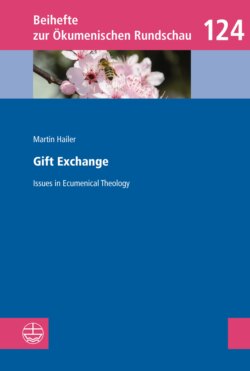Читать книгу Gift Exchange - Martin Hailer - Страница 8
На сайте Литреса книга снята с продажи.
Preface
ОглавлениеEcumenical theology as such does not exist. Those trying to compose it ended up in mere abstract phrases or in highly reductive layouts. Frustrations like these are inevitable when one attempts to do theology stripped of close contact to the actual life of a denomination and its tradition of theological thinking. Therefore rather than ecumenical theology as such there are ecumenical endeavours within the many ventures of doing theology. Whenever an author or a study group is aware of the fact, that the gospel allows others to draw different yet coherent conclusions from it, one might speak of the presence of ecumenical awareness. This volume presents ecumenical awareness from the perspective of a given denomination. It takes a tour d’horizon through a number of dialogue processes and theological discussions the Lutheran Church and theology are intertwined with. That is its way of paying respect to the fact that ecumenical theology is not an abstract discipline in itself but a series of specific endeavours. Nevertheless the last chapter reflects on ecumenical hermeneutics in order to further improve its methods.
This book’s material was first presented as a series of guest lectures at Canterbury Christ Church University and at King’s College, Aberdeen. The result is an English book from a German perspective: My English speaking dialogue partners in mind I widely referenced and quoted books and articles in German not only because they influenced my position, but also to foster theological exchange over the divide different languages still provide.
After the lectures at Canterbury and Aberdeen I was able to discuss most of the material with my students at Heidelberg University of Education, with colleagues at the universities of Bochum, Munich, and Heidelberg as well as with ministers and broader audiences at various places. Many thanks to Professor Risto Saarinen of Helsinki University, who supported my writing through an exchange of letters and e-mails concerning the Finnish interpretation of Luther. His research studies on the concept of gift provided the central idea to understand ecumenical discourses as exchange of gifts, as can be seen in both the introduction and the final chapter. When I found myself in serious doubt Professor Friederike Nüssel of Heidelberg University encouraged me to pursue the project.
Furthermore, I am especially grateful to Elisabeth Wiedemann and to Brian D. Asbill. Both of them studied the manuscript in a selfless way, deleted a large number of mistakes and carefully improved my use of the English language. Without their contribution I would not have dared to publish the manuscript. However, any remaining mistakes and unclarities are entirely my own. Stephan Mikusch’s typographic expertise helped to put the book into shape.
Beyond words are my thanks to Brigitte Gallé, my wife: She not only endured a mentally absent husband at times, but with her being a Mennonite also adds an ecumenical dimension to our every-day life, that I would not want to miss.
The book is dedicated to one of the Church Fathers in ecumenism of our day. A catholic theologian himself, Otto Hermann Pesch used to teach at the department of Protestant theology at Hamburg University for 25 years. His seminal work’s title Catholic Dogmatics from Ecumenical Experience (Katholische Dogmatik aus ökumenischer Erfahrung, 3 vol.s, 2008–2010) is programmatic in itself: We need not strive for ecumenical theology “above” the denominations. Rather denominational theology should discover that it needs complementary partners in order to do its own work in proper fashion.
When I first met Otto Hermann Pesch many years ago, he turned to me and said: “In order to take you seriously, I have to ask you, do you play a musical instrument?” Fortunately, I am an amateur viola player. Pesch, by contrast, played the piano and the organ like a professional musician. He used to practise one of his instruments every single day for an hour. This was not just a musically educated scholar’s habit, but a core insight into the theology of the gift: Musica optimum Dei donum.1
Heidelberg, Pentecost 2019, Martin Hailer
